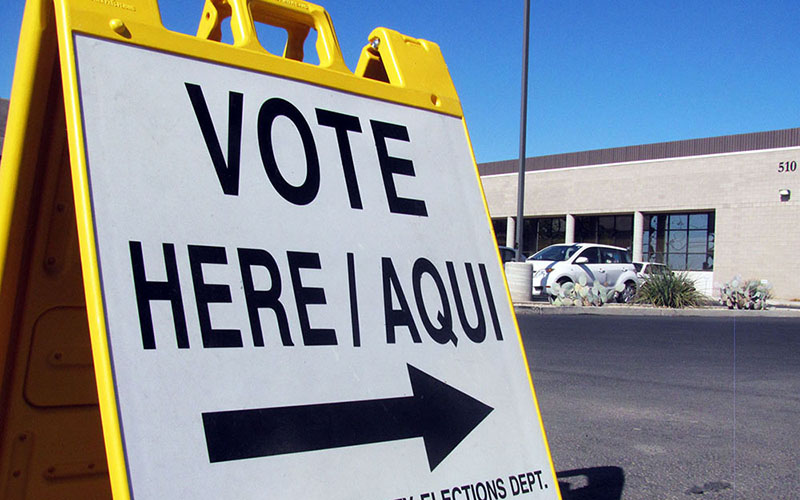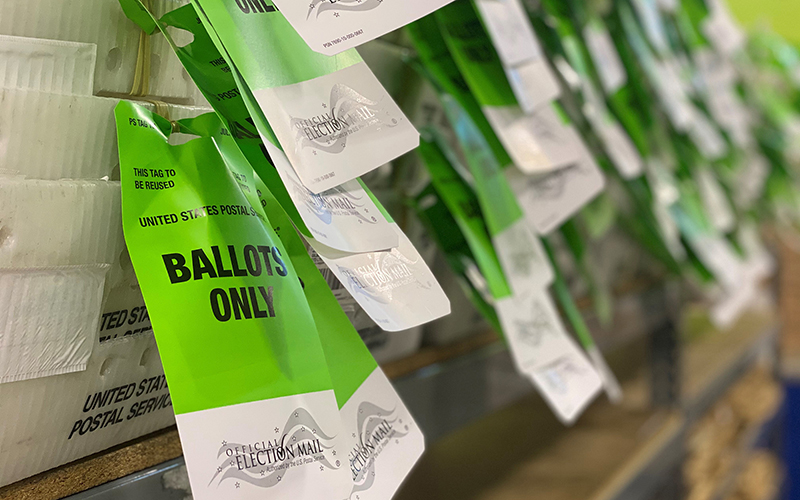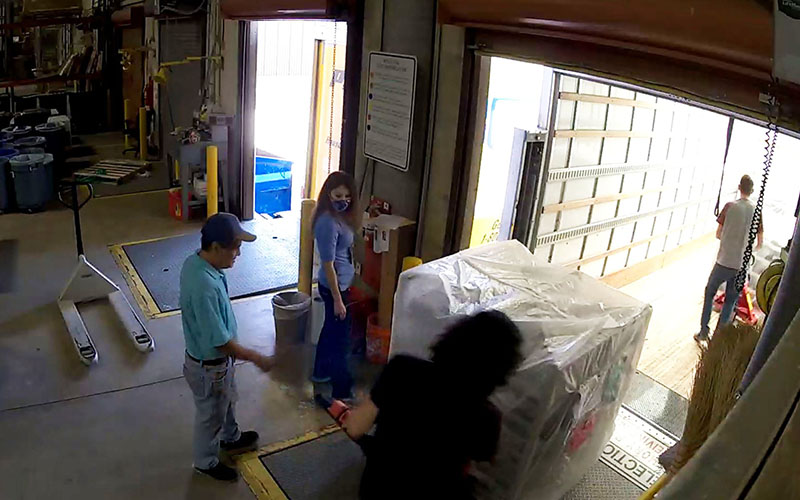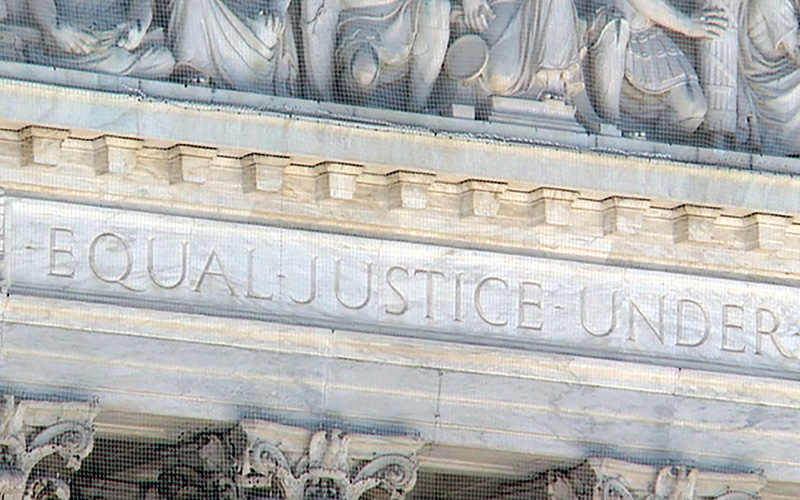
After months of telling Arizona officials that the state Senate’s audit of the Maricopa County election could run afoul of federal election laws, the Justice Department issued voting rights guidance to all states Wednesday. The guidance did not name Arizona but spelled out several situations currently playing out in the state it said could violate federal law. (File photo by Natasha Khan/Cronkite News)
WASHINGTON – The Justice Department issued guidance Wednesday on voting rights and on the pitfalls of post-election audits, reminders that were sent to all states but clearly aimed at Arizona and its audit of Maricopa County elections.
The two statements follow months of warnings from the department raising concerns about the security of the more than 2 million ballots that were handed over to a private firm for review and its plans to go door-to-door to question voters.
While the department’s guidance cited states’ rights to conduct elections, it also laid out controlling federal law, and Attorney General Merrick Garland said in a prepared statement that “where violations of such laws occur, the Justice Department will not hesitate to act.”
A department official said the guidance – which put “audits” in quotes, as many critics of the state’s review have done – released Wednesday was aimed at keeping other states from repeating the concerns that have been raised to Arizona.
“I think the reason we’re issuing this as guidance is to tell jurisdictions generally that we are concerned that if they’re going to conduct these so-called audits, they have to comply with federal law,” said a department official, speaking on background Wednesday. “And warning them that they can’t conduct these audits in a way this is going to intimidate voters.”
Calls seeking comment from state Senate President Karen Fann, Arizona Attorney General Mark Brnovich and officials at Cyber Ninjas, the company in charge of the election review, were not immediately returned Wednesday.
But Arizona Secretary of State Katie Hobbs, a sharp critic of the election review, welcomed the Justice Department’s latest move.
“I have been raising concerns to the Department of Justice Civil Rights division about the audit in Arizona since the start of this fiasco,” Hobbs said in a statement Wednesday. “Many of the concerns I shared with the Department of Justice months ago were related to federal laws regarding the preservation of ballots and equipment.”
In a Washington Post editorial in June, Hobbs called the “audit” by Cyber Ninjas “an absurd spectacle” aimed not at instilling confidence in the election but in digging up “nonexistent evidence” and spreading wild conspiracy theories to support the “big lie” that President Donald Trump won the election.
The Justice Department wrote Fann on May 5 to express “concerns regarding at least two issues of potential non-compliance with federal laws enforced by the Department” in relation to the ongoing election audit. Wednesday’s guidance was a follow-up to that letter, a Justice official said.
“We sent a letter earlier this spring to Arizona, indicating concerns that we had there with Arizona’s plan to have a private company go door-to-door in certain neighborhoods to ask voters if they cast their ballots or not,” the official said on background. “We just reminded them that federal law prohibits engaging in actions that are likely to deter voters from voting in the future.”
While the latest guidance does not name Arizona specifically, it repeats many of the issues that critics have raised about the process, including Cyber Ninjas’ lack of experience. It notes that while election audits are “exceedingly rare,” the law still requires election officials to ensure a chain of custody “so that a complete and uncompromised record of federal elections” is maintained.
“Where election records are no longer under the control of elections officials, this can lead to a significant risk of the records being lost, stolen, altered, compromised or destroyed,” the document said. “This risk is exacerbated if the election records are given to private actors who have neither experience nor expertise in handling such records and who are unfamiliar with the obligations imposed by federal law.”

The state Senate ordered a recount of more than 2 million ballots cast in Maricopa County for president and U.S. senator in 2020. The vast majority were cast early by mail. (Photo courtesy Maricopa County Elections Department)
It specifically mentioned Cyber Ninjas’ proposal to canvass three precincts in Maricopa County to collect information on the 2020 election, saying such “activity raises concerns regarding potential intimidation of voters.”
“When such investigative efforts are directed, or are perceived to be directed, at minority voters or minority communities, they can have a significant intimidating effect on qualified voters that can deter them from seeking to vote in the future,” it said. The guidance said it is elections officials’ duty to ensure that any such canvass “had neither the purpose nor the effect” of dissuading voters.
Cyber Ninjas told Fann and Senate Judiciary Committee Chairman Warren Petersen earlier this month that, after six months of work, it had completed its hand count of more than 2 million ballots cast in the presidential and Senate elections in the county. But officials said they still need more information from the county before they can issue a “complete forensic audit.”
Fann, who has said repeatedly that the goal of the audit is not to overturn November’s elections but to restore confidence in voting security, reportedly issued new subpoenas this week for more election information from Maricopa County officials.
Maricopa County spokesperson Fields Moseley said Wednesday that he had not had a chance to review the latest documents from Justice. But he pointed to multiple reviews of voting equipment, before and after every election last year, as well as hand counts – in which the political parties participated – of a statistically significant number of ballots that “showed the tabulation equipment was 100% accurate.”
Even then, he said, because of the claims of election irregularities circulating last fall, the county supervisors grilled county staff before canvassing the election.
“Our leaders here in Maricopa County have stated many times publicly this ‘audit’ is unnecessary and the contractors lack the necessary knowledge about elections processes,” Moseley said in an email. “The 2020 General Election was secure and run with integrity.”
In the second guidance issued Wednesday, the department reminded states that federal law protects the right to vote in a “range of different ways,” including voting early or voting by mail. Numerous states approved new voting restrictions this year, that did everything from reducing early voting hours to limiting ballot drop-offs and even making it a crime to provide food or water to people waiting in line to vote.
Arizona lawmakers, for example, changed the state’s Permanent Early Voting List to an Active Early Voting List, which means voters on the list will no longer be mailed an early ballot if they have not voted by mail for two elections.
Both documents from the Justice Department emphasized the “interaction of federal and state law when it comes to regulating the election,” and warned states that regardless of state law, they must comply with federal statutes.
With other states reportedly considering their own audits, Hobbs said she hopes officials will heed the guidance from Justice.
“Unfortunately, the damage has been done here in Arizona, but I hope this guidance will help other states protect the integrity of their ballots and equipment,” she said.


